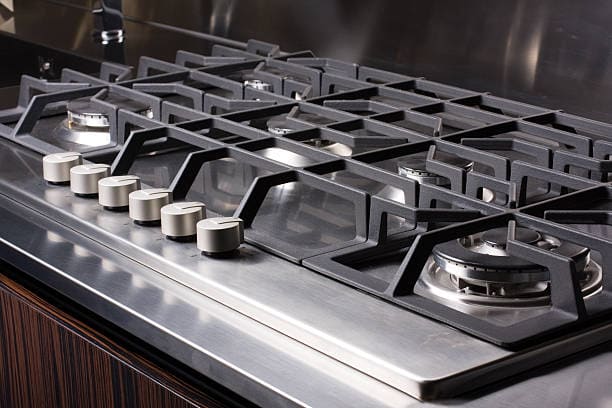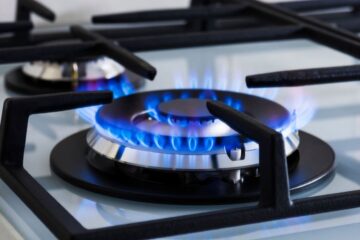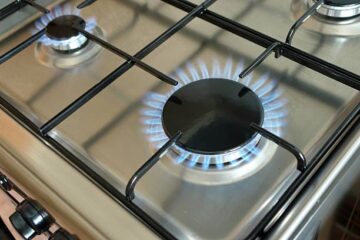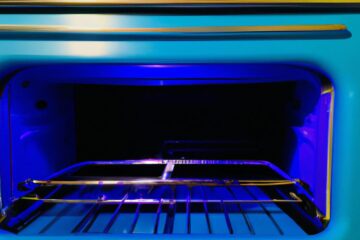Like all appliances in your home, your gas stove requires proper ventilation to function safely and effectively. Suppose you’re installing a new gas stove, or you’re moving into a home with an existing gas stove that hasn’t been properly vented in the past. In that case, it can be helpful to know which of your stove’s components need to be vented and why venting them is important in the first place.
This guide will help you understand the ventilation requirements for gas stoves, whether or not they are vented, and what types of vents are appropriate for your home.
Do Gas Stoves Need To Be Vented?
Yes, gas stoves need to be vented. You see, gas stoves produce harmful PM 2.5 particles that can harm your health if inhaled. This is because the stove warms up your home, which will burn certain things (like wood) that create PM 2.5 particles. These particles are found in smoke and are especially dangerous when breathed in or ingested.
To prevent this from happening, ensure your gas stove is properly vented and has a good exhaust system that can eliminate the PM 2.5 particles before they get into your home.
Reasons Why Gas Stoves Need To Be Vented?
Gas stoves are a great way to cook your food, but they also have the potential to be dangerous. If your stove is not vented, you may be putting yourself at risk of carbon monoxide poisoning.
Here are some reasons why you need to vent your gas stove:
Gas stoves need to be vented because they emit carbon dioxide. Carbon dioxide is a gas that can cause greenhouse gas emissions and global warming. Gas stoves are a part of the home’s heating system, so they must be vented properly. If a stove does not vent properly, it can cause an indoor air quality problem.
Gas stoves need to be vented because they emit carbon dioxide as a byproduct of their operation. Carbon dioxide is an important greenhouse gas, which means it contributes to global warming and climate change. A stove that produces too much carbon dioxide will harm your home’s indoor air quality.
Gas stoves must be vented because they can leak when not used or maintained properly. Leaking gas stoves can cause problems with indoor air quality if they are not vented properly or if there are other sources of moisture in your home, such as leaking pipes or furnaces that leak during use or maintenance seasonally (e.g., winter).
Gas stoves need to be vented because they can produce excessive heat that may damage your home’s materials if you do not vent them properly.
When Do Gas Stoves Need To Be Vented?
If you have a gas stove, you’re probably wondering when it’s time to vent your stove.
The short answer:
When the pilot light goes out.
This is why we recommend you check your stove regularly and ensure it’s working properly. If it seems like your pilot light has gone out, or if you notice any other problems with your stove, you should always check with an expert to ensure that you don’t have any safety concerns.
Gas Stove Venting Requirements
There are some basic rules to follow when venting your gas stove.
The first rule is to have a chimney liner and a firebox damper on all stoves. A chimney liner is a steel mesh liner installed in the fireplace opening and around the flue. It prevents soot from entering the house through the chimney, leading to carbon monoxide poisoning.
The second rule is that an exhaust fan or grate system should vent all stoves. This allows for proper air circulation in the room, and room air does not enter your home through your stove exhaust pipe.
Another thing you need to know about installing an exhaust fan or grate system is that it should be installed at least three feet above floor level and have a minimum clearance of six inches, if possible. An exhaust fan should also have an adjustable height feature so you can adjust it as necessary for different rooms within your home.
Suppose you live in an area where temperatures rise quickly during the summer months. In that case, you may want to consider installing a gas stove with an outdoor vent pipe because this will allow heat out while keeping smoke out of your home.
How To Properly Vent A Gas Stove?
Properly venting a gas stove is an important step to take to keep your home safe and comfortable. However, many people don’t know how to do it properly.
This article section will show you some simple tips and tricks to help you get started.
The first step to properly vent a gas stove is to ensure it’s off. Next, open the damper on the stove and turn it counterclockwise until you hear a click.
Next, turn off the gas supply to your stove by flipping the valve shut in the middle of your stove. To do this, turn the valve all the way counterclockwise and then all the way clockwise again, making sure that you don’t hear any gas escaping from your pipes before turning them off completely.
After you’ve turned off your gas supply, please turn off your stove’s pilot light with a screwdriver or an adjustable wrench so that it doesn’t continue igniting when you turn it back on again.
How To Vent A Gas Stove In An Island?
If you have an island in your home, it’s important to know how to vent a gas stove.
When venting a gas stove, there are several steps that you can take to ensure that your family and guests are not at risk for carbon monoxide poisoning.
First, ensure all the vents on your stove are open and functioning properly.
Next, turn off the gas supply line from your gas meter to the gas valve by turning off the main shutoff valve and then closing off the gas line with a hose clamp. This will prevent any escape of gas into your home.
After doing this, open all the remaining vents on your stove until they are fully opened—this will allow airflow through them and prevent them from becoming clogged with soot or grease buildup.
Do Electric Stoves Need To Be Vented?
It would be best if you considered installing a vent for your electric stove. Vents help remove smoke, steam, and other airborne particles from your cooking area, keeping your kitchen cleaner and safer.
It’s easy to forget that the fan circulating your electric stove can cause an explosion in the event of an electrical short circuit. This is why it’s so important to install a vent in your home—it prevents any risk of fire or explosion caused by your stove.
Does A Natural Gas Stove Need To Be Vented?
Yes, a natural gas stove needs to be vented.
This is simple: A venting system allows the stove to burn cleanly and efficiently. When there is no venting system, the stove will produce smoke that is unhealthy and can make your home smell like an ashtray. This can be disconcerting if you have guests over or if you are cooking in a closed space.
A venting system prevents carbon monoxide poisoning from building up inside your home if you use your stove often. Carbon monoxide is created when gas burns and turns into a gas that can kill you if there isn’t enough ventilation and proper ventilation systems are not in place.
Do Gas Cooktops Need To Be Vented?
Gas cooktops are a convenient way to cook food, but they can be dangerous if they’re not vented. Venting your gas cooktop will prevent a fire from starting and also keep your home safe from carbon monoxide poisoning.
Gas cooktops use an element to heat the cooking surface. If you don’t vent them properly, the gas can build up inside your home and cause a fire or carbon monoxide poisoning.
Gas is highly flammable, but it’s also odorless and colorless. Suppose you have unvented gas cooktops installed in your home. In that case, some of that flammable gas will escape into the air around them instead of being vented away from your house each time you use them. This can cause an explosion if there’s unvented gas in the air outside your home.
Suppose you have unvented gas cooktops installed in your home. In that case, some of that flammable gas will escape into the air around them instead of being vented away from your house each time you use them. This can cause an explosion if there’s unvented gas in the air outside your home.
How Often Do Gas Stoves Explode?
Gas stoves are a great way to cook a meal on the cheap. But they aren’t always the safest option. There is a high risk of explosion when using a gas stove.
Gas stoves are made from metal and can be dangerous if they explode due to carbon monoxide fumes or other causes. Gas stoves are also not designed for outdoor use, so avoid them if you plan to cook outside.
If you don’t want to worry about an explosion in your home, it’s best to use an electric stovetop instead. Electric stoves are safer than gas stoves because they won’t explode when turned on too high or too fast; however, they are usually not as versatile as gas models.
Does A Gas Cooktop Need To Be Vented Outside?
In most cases, you don’t need to vent a residential Gas Cooktop to the outside in the United States.
Gas cooktops are designed to burn gas and operate at higher temperatures than electric stovetops. This is why they often have a vent on the top of the unit that allows heat exhaust to escape through the roof of your house. If this isn’t present or working properly, it could result in an over-heated kitchen. In these situations, it’s best practice to call a technician who can evaluate your home’s heating system and recommend solutions for any issues that may be present.
Does A Gas Stove Need To Be Vented in Ontario?
Whether you’re an avid home cook or want to ensure your stove is working at its best, the last thing you want is for it to be a fire hazard. Luckily, there’s a way to protect yourself and your family from the dangers of cooking with gas: install an exhaust hood!
You might be wondering: do I need an exhaust hood with a gas stove? The answer is yes! Unless your installation instructions specifically say that you don’t need one, you need an exhaust hood that vents to the outdoors.
Related Queries
Do Gas Tankless Water Heaters Need To Be Vented?
Gas tankless water heaters need to be vented to adequately vent gas, which is released when a hot water tank is pressurized. Gas tankless water heaters are typically vented with an internal fan and ducting that connects the water heater to an external chimney or vent pipe.
Venting a gas tankless water heater is not required by code in all states. Still, it is recommended by many manufacturers because it will make your unit more efficient and help you avoid gas odors. If you have a gas-powered water heater without venting, there’s a good chance you’ll be able to smell fumes inside your home at some point during the heating season.
Do Gas Space Heaters Need To Be Vented?
Gas space heaters are a great way to heat spaces without the hassle of ductwork or vents. These small appliances, which come in various shapes and sizes, can be used in rooms with limited space, like bathrooms and closets. They’re also ideal for smaller rooms with ventilation systems, like garages and attics.
Space heaters provide heat without the need for vents or ductwork. This makes them ideal for small spaces or areas where conventional heating would be difficult to install.
Does A Gas Convection Oven Need To Be Vented?
A gas convection oven doesn’t need to be vented because it doesn’t use a fan or blower to circulate air.
Convection ovens use hot air from the bottom of the oven to heat food from the top, meaning there’s no need for a fan or blower. The hot air is circulated under pressure through a metal tube (called a “convection grate”) and then into your food.
Do Induction Cooktops Need Venting?
Yes, induction cooktops do need ventilation.
We say this because the heat generated by induction cooktops can be dangerous if left unchecked. This is because the heat is distributed evenly across the cooktop’s surface, meaning that it doesn’t have to be contained within a specific area—and, therefore, could potentially cause burns. Suppose you’re going to use an induction cooktop. In that case, you should make sure it has adequate ventilation to prevent injury from overheating.
Gas Oven Venting Too Much Heat
If your oven is venting too much heat, there are several things you can do to fix the problem.
First, check for a blockage in the vent. This could be caused by dirt or grease. If you find a blockage, use a hacksaw to cut it out and clean the area with a vacuum cleaner.
Next, check for any burned-out pilot lights. If you have one that’s been out for a while and hasn’t been replaced, replace it with an electric one before you start cooking again.
Finally, ensure that your oven is not leaking gas into the house or causing carbon monoxide poisoning by venting through a window or door without proper ventilation.
Does A Propane Range Need To Be Vented?
Yes, a propane tank must be vented. Propane is heavier than air, so it sinks to the lowest possible point. In many homes, the lowest point is under the kitchen sink. If the gas escapes from the tank and is not vented, it can seep underneath the sink and cause an explosion.
Induction Cooktop Venting Requirements
Induction Cooktops are a great way to cook, but they have some special ventilation requirements.
- If you’re using an induction stove top, it is important that the vent hood or vent in your kitchen is properly vented so that the smoke and gases from cooking don’t drift into your home. This can cause carbon monoxide poisoning if not given proper ventilation.
- The induction cooktop will also produce fumes if you don’t have a hood or vent that works properly to circulate air around the room where it’s being used. Suppose you’re using an induction stove top in an area without enough ventilation. In that case, these fumes can build up and cause health problems for people who are sensitive to them – including your pets!
- Make sure that if you do use an induction cooker, you also have a properly functioning exhaust fan or fan system that is vented outside through your windows or doors so that all of this escaping heat doesn’t stay inside your home on cold days when temperatures fall below freezing outside!
Built In Oven Ventilation Requirements
An oven ventilation system is a must-have for any commercial kitchen. This is because the ventilation system helps control the kitchen’s temperature and humidity levels. It also helps to maintain the cleanliness of your commercial kitchen by removing smoke and odors from the air.
You must install a built-in oven ventilation system in your commercial kitchen as soon as possible. If you wait until it’s too late, you may have to pay for repairs or replace your built-in oven ventilation system.
The following are some tips on how you can choose the right type of built-in oven ventilation system for your commercial kitchen:
- Look for a product with many options and settings, such as fan speeds and airflow settings. You should also look at how easy it is to install this product on your commercial ovens or range tops.
- Look at how easy it is to operate this type of product without having to worry about installing sensors or wires into your cabinets or drawers where these products will be installed; these products will require no wires or sensors outside of themselves!
The Final Words
If you’re a homeowner with a new gas stove, you may have questions about whether or not you need to vent your gas stove. We’ve put together this blog post to answer some of the most common questions people have when they first get their gas stoves. If you have any additional questions or concerns, don’t hesitate to get in touch with us. We would love to help!
Frequently Asked Questions
Can You Use A Gas Stove Without Vent?
It is not safe to have a gas stove without a vent. If you want to use a gas stove without a vent, you will need a ventilation system like an exhaust fan. Otherwise, the gas can build up in the house and lead to a deadly explosion. It is extremely important to have proper ventilation to prevent this.
Can You Have A Stove Without A Vent?
Yes. You can. You will find lots of kitchen countertops with the stove built-in. But it’s not recommended. The risk of electrical fire is high. Keeping a 2′ distance between the stove and any flammable things is a good idea. Plus, if you’re clumsy like me, you might spill the cooking oil, creating an explosion. But if you still want to, you should have an automatic shutoff device for the stove and a fire extinguisher at hand.
Why Does A Gas Stove Not Need To Be Vented?
The gas stove doesn’t need to be vented because the combustion of natural gas produces minimal amounts of carbon monoxide. This chemical triggers your sense of smell. In other words, it doesn’t produce carbon monoxide. However, it still burns and releases carbon dioxide, nitrous oxide, water vapor, and other non-toxic gases into the atmosphere.




